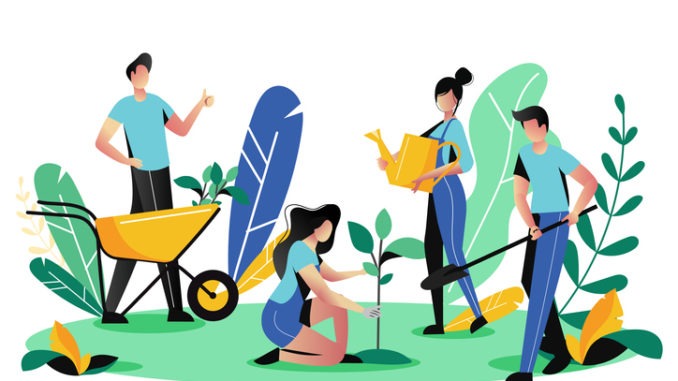
After a year in and out of lockdown – spent mostly sterilising and keeping our hands clean – Becky Wright says that now is the time to get your hands dirty!
CREDIT: This is an edited version of an article that originally appeared on Happiful
Over the last year many of us have come to rely on our gardens and local green spaces more than ever. Faced with periods of social restrictions, we’ve rediscovered the importance of connecting with nature for our mental and physical wellbeing.
It’s been a privilege to get outside into the fresh air – something I hope we remember over the coming months, as normality resumes -and this is something that’s been echoed in a new study published in the journal Cities, which adds to existing evidence that gardening is good for us.
The study, of more than 6,000 UK residents, found that people who garden frequently (at least two or three times a week) felt less stress and an increased sense of wellbeing. People who garden every day had wellbeing scores 6.6% higher, and stress levels 4.2% lower, than those who did not garden at all.
This new research, conducted by the Royal Horticultural Society (RHS) in collaboration with the University of Sheffield and the University of Virginia, found that the outdoor hobby has been shown to boost mental health, with those with health problems stating that gardening eased episodes of depression (13%), boosted energy levels (12%) and reduced stress (16%).
The study also found that gardening was linked with greater physical activity; the results were comparable with those associated with daily exercise, supporting the idea that gardening is good for both body and mind.
What are the other benefits of gardening?
After a year of sterilising everything in sight, it appears that there’s yet another important benefit to getting our hands dirty. “Getting our hands in the earth may be an important ingredient for maintaining our health,” Sue Stuart-Smith, psychiatrist, psychotherapist and author of The Well-Gardened Mind: Rediscovering Nature in the Modern World, told The Times.
“The neuroscientist Christopher Lowry discovered that a bacterium commonly found in soil can boost serotonin levels in the brain. Not only that, but other studies show that the ‘friendly’ bacteria that live in the soil might boost our immune systems; a single teaspoon of garden soil contains something in the region of a billion microbes.”
Of course, improving health isn’t the typical motivator for most gardeners, but it’s a very common by-product that comes with the effort put in. “Gardening is like effortless exercise because it doesn’t feel as strenuous as going to the gym, for example, but we can expend similar amounts of energy,” explains RHS wellbeing fellow and lead author of the study Dr Lauriane Chalmin-Pui. “Most people say they garden for pleasure and enjoyment, so the likelihood of getting hooked on gardening is also high.”
Additionally, if you can grow your own produce in a vegetable patch, or grow fruit trees, this can have a positive impact on your diet. As nutritional therapist Lowri Turner explains, eating with the seasons can not only improve your relationship with food but can also help to balance your energy.
“Foods grown and eaten out of season may have been artificially enhanced with things such as pesticides or fertilisers in order to bring on ripening,” she says. “If they have been grown a long way away, they may have been processed to extend shelf life using preservatives.” So, where possible, Lowri recommends growing your own. “You don’t need acres of land; herbs can be grown in a pot on a windowsill.”
The use of gardening as therapy isn’t anything new. Many of us already know about, or have come to discover, the pleasures of horticultural therapy during lockdown. Previous studies have pointed to boosts in serotonin in the brain from being outside, as well as the light exercise that gardening provides. Other research has shown that repetitive chores, such as weeding and watering, can induce a meditative-like state.
Resources to help you get your daily dose of ‘Vitamin G’
Whether you’re new to gardening or class yourself as green-fingered, there’s always more to learn! Try these resources to help you create the garden of your dreams.
- 5 flowers for a bee-friendly garden – how to create some honeybee hotspots this summer, when bees’ food supply is most stretched.
- Happiful’s gardening guide – download Happiful’s free guide to the plants that you can nurture in your garden to help support British wildlife. There are also tips on the small things that we can do to make our natural spaces more accessible to all creatures, great and small.
Even if you haven’t got a garden of your own, there are still ways you can benefit from the power of caring for Mother Nature. Looking after house plants (or office plants) has wellness-boosting effects, and taking on an allotment can be fruitful for your mental health, and your cooking, too.
With all these benefits, it’s clear that gardening is an incredible, all-around, mood booster. So, if you’re looking for a new hobby to keep you grounded as lockdown restrictions ease, I encourage you to give gardening a go.



Be the first to comment